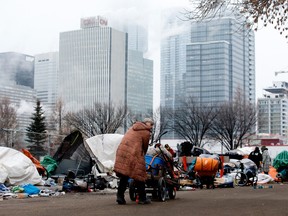“There’s a polarization on the issue: pretty much half of people say, ‘Get these people out of here, they should not be here, they’re breaking all sorts of bylaws.’

Article content
A new online survey has found that two-thirds of Canadians consider homelessness to be a “major problem” in the country.
But Canadians were split on how municipalities should address the rise of tent cities with 46 per cent supporting their immediate dismantling and an almost equal number (42 per cent) against that course of action.
Article content
Findings from the online survey, conducted by the Vancouver-based public opinion firm Research Co., were published this week as part of an online discussion about homelessness and tent cities presented by Postmedia.
Advertisement 2
Article content
Research Co. president Mario Canseco said the poll highlights the increased importance of homelessness as a top-of-mind issue.
“People are thinking that it might be a situation that is getting out of hand,” Canseco said in an interview. “But there’s a polarization on the issue: pretty much half of people say, ‘Get these people out of here, they should not be here, they’re breaking all sorts of bylaws.’ Then you have the other half who says, ‘No, this is too heavy-handed.’”
Across the country, civic leaders have taken starkly different approaches to managing tent encampments. Cities like Hamilton, London and Gatineau have taken a human rights-based approach that offers stability and support for those living in tent encampments. Other cities, such as Edmonton, Vancouver, Toronto and Montreal, have conducted clearance operations to eliminate large, problematic encampments.
A sizable majority of Canadians said homelessness has increased both in the country (71 per cent) and in their province (67 per cent) during the past three years. Respondents in Ontario (73 per cent), Atlantic Canada (71 per cent), British Columbia (70 per cent) and Alberta (69 per cent) were most likely to report a rise in homelessness.
Advertisement 3
Article content
While survey respondents were split about the need to dismantle tent encampments, there was majority support for other initiatives to address homelessness. Most respondents endorsed better mental health supports (75 per cent) and temporary housing (79 per cent) for those living on the street.
Most respondents also endorsed the idea of offering incentives to developers to build affordable housing (75 per cent) and changing zoning laws to allow for increased density (65 per cent).
During Postmedia’s online forum, Conservative MP Scott Aitchison, the party’s housing critic, said the solution to homelessness and tent encampments starts with better national leadership.
“The fact of the matter is we need leadership at the national level to work with provinces and municipalities,” he said.
Aitchison, the former mayor of Huntsville, said the government has to increase the supply of both homes and affordable housing units, while curbing demand. “In many cases, when it comes to housing, we need government to get out of the way,” he said.
Jean-Pierre Poulin, the founder and CEO of Gatineau’s Devcore Group, told the panel that property developers must also play a role in solving the problem.
Advertisement 4
Article content
“I feel that homelessness is a responsibility of the real estate industry in general,” said Poulin, who spearheaded the establishment of a winterized tent encampment for Gatineau’s homeless.
“It’s too easy to say it’s the provincial government or the city or the federal government: It’s a real estate issue at the base so it should be dealt with by real estate leaders in each community.”
Kaite Burkholder Harris, executive director of Alliance to End Homelessness Ottawa, said she would like to see rent subsidies used to get people off the street quickly and into available housing, where they can be supported in their recoveries. “It doesn’t solve everything overnight but it gets people housed,” she told the online forum.
Such short-term measures are necessary, she said, because it will take years to close the current “housing gap.”
The Research Co. survey found that half of Canadians blame a lack of affordable housing for the current homelessness crisis. Others cited mental health issues (46 per cent), poverty (40 per cent), a poor economy (33 per cent) and individual emotional trauma (24 per cent) for the problem.
The survey of 1,001 Canadian adults was conducted over three days in late February. In theory, in 19 cases out of 20, the results would not differ by more than 3.1 percentage points from results obtained by surveying every adult Canadian.
Article content



